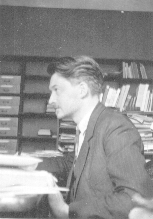
AnthonyFlood.com
Philosophy against Misosophy

Jacques Maritain
1882-1973
From Philosophy and Phenomenological Research, 18:4, June 1958, 561-62. Reviews of Jacques Maritain, Bergsonian Philosophy and Thomism, New York: The Philosophical Library, 1955, pp. 383; and The Social and Political Philosophy of Jacques Maritain. Selected Readings edited by Joseph W. Evans and Leo R. Ward. New York: Charles Scribner’s Sons, 1955, pp. xiv, 348.
Reprinted here not to endorse the nice things Maritain had to say about democracy, but rather to honor the reviewer, the late Plotinus scholar and author of "St. Thomas and the Language of Total Dependence."
Maritain Studies: Two Reviews
John N. Deck
Bergsonian Philosophy and Thomism incorporates a translation of Prof. Maritain’s first published work, La Philosophie Bergsonienne (1913), in its 1930 revision, plus an “Essay on Appreciation” dated 1940, and short notes written later.
In the basic text, Bergson is criticized in the light of Thomistic realism, intellectualism, and regard-for-distinction. The affirmation that Bergson confuses human freedom with animal spontaneity, and in reality reduces the former to the latter indicates a characteristic Maritainisn motif—human freedom as specifically rational—that occurs constantly in his later political and social philosophy.
Taken as a whole, this expanded reissue furnishes most of the materials for a history of Maritain’s valuations of Bergson. The original work argues against Bergson in the name of St. Thomas, but sees a “Bergsonism of intention” which is “oriented toward Thomistic wisdom.” The “Essay on Appreication” takes up, more trenchantly yet sympathetically, the same basic themes. For Maritain Bergson remains the “master, who freed in me my metaphysical desire . . . . whose doctrine I had criticized—through love of truth, as he well knew.”
The Social and Political Philosophy of Jacques Maritain is a topically organized anthology drawing from M. Maritain’s numerous books and papers on the subject. The editors have done a commendable job of selection and articulation.
M. Maritain, seeing man as a person “a universe in himself open to the universe of truth and goodness,” favors that trend of modern history which has issued in the “democratic secular faith.” He considers the modern interpretation of civil society as specifically temporal to be a positive gain. He looks forward to a personalist and pluralist democracy in which the common good will be existentially the personal good of its members, but he insists that this society must be worked for and worked through. The democratic faith, as M. Maritain interprets it, is the practical guiding energy of a society working out the freedom of its members. Its inspiration is practical intuition and the “gospel leaven”—adhesion to its demands no religious or philosophic conformity.
Assumption [now Windsor] University, Windsor
Posted June 15, 2006